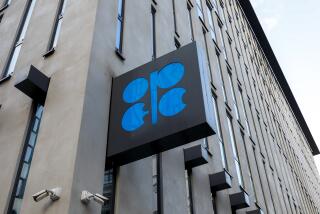OPEC Oil Cartel Agrees to Raise Production Limit
JAKARTA, Indonesia — OPEC ministers agreed Saturday to pump more oil, running the risk of lower prices to accommodate a move by top producer Saudi Arabia to assert more influence over the market.
The 11-member oil cartel raised its stated production ceiling by 10%, with the Saudis and their allies in Kuwait and the United Arab Emirates prevailing over other producers who fear that prices will fall.
Cheaper costs for oil, the most vital commodity in the world economy, would be a bargain for consumers but bad news for the Organization of Petroleum Exporting Countries and other producers.
Iran and Libya tried to hold the line at a smaller increase, or no increase at all, worrying that global demand will not rise fast enough to accommodate all the new oil.
The oil ministers set OPEC’s official production ceiling at 27.5 million barrels a day, up from the current 25.033-million-barrel limit that is being widely violated. The new number was at the top end of those being negotiated over the past four days.
The increase in actual oil production will be more modest than the stated 2.5 million barrels a day, given the massive cheating on output quotas that complicates any correlation between OPEC’s official numbers and real shipments going onto the market.
In a way, OPEC’s new numbers--reached in its most contentious talks in years--merely narrow the gap between the facts and fictions of the group’s oil production.
But the revised numbers aren’t entirely bogus. OPEC oil production could go as high as 28.5 million barrels a day--1 million barrels over the new ceiling and about 700,000 barrels over the group’s current true production, a Persian Gulf source said, speaking on condition of anonymity.
Some ministers who lost the battle for a smaller number sought to play down any damage, but others were less optimistic that any price fall could soon reverse itself.
Futures traders will start giving their verdict on the OPEC move when markets open Monday.
OPEC members are Algeria, Indonesia, Iran, Iraq, Kuwait, Libya, Nigeria, Qatar, Saudi Arabia, the United Arab Emirates and Venezuela.
Prices of light sweet crude oil were down to about $19 a barrel on the New York Mercantile Exchange last week in anticipation of OPEC’s move toward increased production.
More to Read
Inside the business of entertainment
The Wide Shot brings you news, analysis and insights on everything from streaming wars to production — and what it all means for the future.
You may occasionally receive promotional content from the Los Angeles Times.










